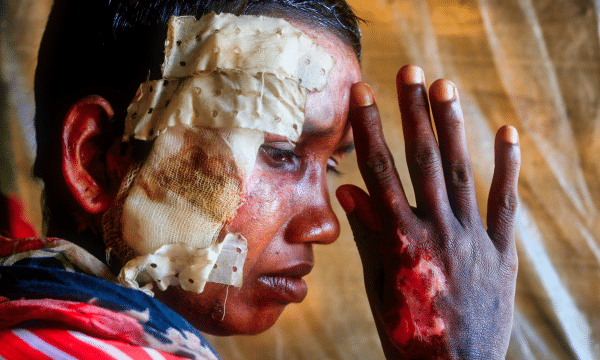
MANDALAY (UCAN): The International Court of Justice (ICJ) in The Hague, the United Nations’ (UN) highest court, ordered measures to prevent the genocide of Rohingya Muslims in Myanmar.
In a momentous and unanimous January 23 decision by a panel of 17 judges, ordered Myanmar to carry out emergency provisional measures and to respect the requirements of the 1948 Genocide Convention.
The decision comes despite Myanmar’s state councillor and de facto leader, Aung San Suu Kyi, defending her country against the accusations in person last month (Sunday Examiner, 22 December 2019).
The court found there was prima facie evidence of breaches of the convention and ruled that the estimated 600,000 Rohingya remaining in Myanmar are “extremely vulnerable” to violence at the hands of the military.
The judgment amounts to a rejection of Suu Kyi’s defense of her country against accusations of systematic human rights abuses and war crimes during a three-day hearing at the ICJ last month.
The case was brought by The Gambia, a Muslim-majority African state that accused Myanmar of breaching the Genocide Convention.
The ruling only dealt with the Gambia’s request for preliminary measures, the equivalent of a restraining order for states. It gave no indication of the court’s final decision, which could take years to reach.
The ICJ said that Myanmar must now take all steps within its power to prevent serious harm to Rohingya and report back within four months.
Gambian justice minister, Abubacarr Marie Tambadou, told the court in December: “Another genocide is unfolding right before our eyes, yet we do nothing to stop it. This is a stain on our collective conscience. It’s not only the state of Myanmar that is on trial here, it’s our collective humanity that is being put on trial.”
In her appearance before the court, Suu Kyi described the violence as an “internal armed conflict” triggered by Rohingya militant attacks on government security posts.
The complaint is one of the first attempts to use the international justice system to help the estimated 730,000 Rohingya refugees who fled Myanmar following military clearance operations in Rakhine state in 2017.
Six of Myanmar’s most senior army officers have been accused of genocide by a UN fact-finding mission and recommended for criminal prosecution.
Once an international icon representing peaceful defiance of military dictatorship, 74-year-old Suu Kyi has been savagely criticised for defending her country’s army over the Rohingya exodus.
She appealed to ICJ judges to dismiss allegations that Myanmar committed genocide and instead allow the country’s court martial system to deal with any human rights abuses.
On January 20, just days before the ICJ handed down its ruling, the government-established The Independent Commission of Inquiry (ICOE) in Myanmar ruled that there were war crimes and serious human rights violations against Rohingya in the 2017 crackdown in Rakhine state but found no genocidal intent.
The ICOE was led by Rosario Manalo, a former deputy foreign minister of the Philippines, submitted its final report to Myanmar’s president, Win Myint, and Suu Kyi.
The commission was set up with two international and two local members in July 2018.
“Although these serious crimes and violations were committed by multiple actors, there are reasonable grounds to believe that members of Myanmar’s security forces were involved in war crimes, serious human rights violations and violations of domestic law in 2017,” the commission said in statement.
“There is insufficient evidence to argue, much less conclude, that the crimes committed were undertaken with the intent to destroy, in whole or in part, a national, ethnic, racial or religious group or with any other requisite mental state for the international crime of genocide,” it insisted.
However the commission admitted that “the killing of innocent villagers and destruction of their homes were committed by some members of Myanmar’s security forces through disproportionate use of force during the internal armed conflict.”
The full report has yet to be made public and it remains unclear whether the government will do so.
Myanmar has always maintained the crackdown was needed to root out Rohingya rebels after a series of attacks left a dozen security personnel dead. However, refugees have given graphic accounts of widespread murder, rape, torture and arson and have so far largely refused to return to Myanmar for fear of their safety.
Kyaw Min, chairperson of the Yangon-based Democracy and Human Rights Party, which works for Rohingya rights, said the commission’s findings appear to reflect the government’s stance, so it raised the question of credibility.
Phil Robertson, deputy Asia director at Human Rights Watch, slammed the panel’s statement as “a politically skewed set” from a non-transparent investigation by commissioners working closely with the government of Myanmar
“The ICOE seems willing to blame individual soldiers for abuses but not the commanders who the UN and other investigations have found were responsible for the numerous systematic atrocities against the Rohingya,” Robertson said in a January 20 statement.
He added that Myanmar should immediately release the full ICOE report in both Burmese and English so that the global community can read for itself how the commission did its work, what it found and how it reached its conclusions.
Aye Lwin, a Muslim leader and a former member of the late Kofi Annan’s Rakhine Advisory Commission, said revealing serious human rights violations seems a positive development but it is important for the military and the government to implement the commission’s findings and take action against perpetrators.
Lwin said it was unfortunate to see a narrative among people and the media that Rohingya are illegal immigrants who should return to Bangladesh.








